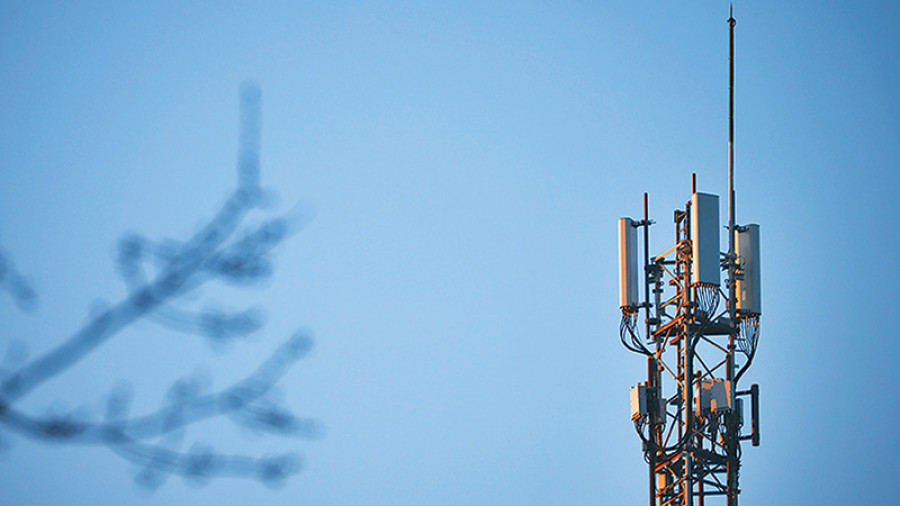Money
5G trial held up due to delay in spectrum allotment
Radio Frequency Policy Determination Committee cannot provide spectrum approval until a new communications minister is appointed, officials say.
Krishana Prasain
The Nepal Telecommunications Authority has rolled out its Trial Working Procedure 2021 for fifth generation mobile internet service, allowing telecom companies to conduct test runs of the super fast 5G technology, but they have not been able to move ahead as spectrum allotment has been held up.
The working procedure was released on July 19, but the trials had to be postponed due to setbacks resulting from recent political developments, officials said.
"Newly appointed Prime Minister Sher Bahadur Deuba is yet to pick a new communications minister, which has delayed allotment of spectrum to potential service providers enabling them to begin the tests," said Purushottam Khanal, chairman of the Nepal Telecommunications Authority.
“Once the minister is appointed, the Radio Frequency Policy Determination Committee of the Ministry of Communications and Information Technology will provide spectrum approval,” he said.
On February 1, the authority submitted a proposal to the National Frequency Determining Committee to allow 5G operation in the country.
According to the authority, 5G bands can be used on the existing ones. As per the technology-neutral principle policy, the operator can use 3G, 4G or 5G on the same band by obtaining permission from the authority.
The authority will provide spectrum to telecom operators without cost to carry out 5G trials, and they cannot charge users during the test period either, Khanal said. The test will last one year.
As per the Trial Working Procedure, the 5G test needs to be conducted in both rural and urban areas. The authority will assist telecom operators to import equipment required for the 5G test. “The authority will revoke the approval if the telecom operator fails to import and install the 5G test equipment within three months of approval,” states the work procedure.
The equipment brought for the trial needs to be returned after it is over. If they can be used for existing services like 4G, the telecom operator needs to obtain re-approval from the authority.
The telecom operator needs to provide technical details during the 5G test on a regular basis as demanded by the authority. The firm has to submit quarterly reports to the authority of the impact, problems, challenges, feedback and suggestions, and a detailed report at the end of the test phase.
The telecom operator should facilitate inspection by the authority and follow its directions.
The spectrum is provided on a temporary basis for the trial, and the operator cannot hold it after the test period is completed as it is not fully authorised. The work procedure also contains other technical parameters.
State-owned Nepal Telecom would have started trial operations if the frequency for 5G operation had been separated.
The 5G tests were slated to launch by the start of the fiscal year in mid-July. The 5G wireless mobile network was said to be rolled out for tests in Kathmandu and three other major cities. The trials may take two-three months or even a year.
The government will work to expand the 5G network under the Digital Nepal Framework 2018.
Dilli Ram Adhikari, managing director of Nepal Telecom, said they had not received spectrum approval from the authority despite submitting a test plan and business plan four to five months ago.
“We cannot move ahead with the process before getting spectrum approval from the authority,” he said. The company cannot proceed with buying equipment for the test before getting the go-ahead.
Adhikari said he could not say when the 5G trial would start with the changes in government.
Nepal is racing to become the first country in South Asia to offer super fast connectivity, but political instability may prevent it from making the achievement.
Telecom operators in India have already started 5G tests in different parts of the country with the government allowing trials in May this year.
According to a report, Bharti Airtel, Reliance Jio Infocomm and Vi (formerly Vodafone Idea) and state-run Mahanagar Telephone Nigam Limited (MTNL) have been approved to start trials for 5G technology as well as its applications in various sectors. The trials will last for six months for now.
The 5G technology standard for cellular broadband networks offers faster connections, higher throughput and more capacity than 4G, and will benefit areas of high traffic such as public places.
According to the latest management and information report of the authority, internet penetration in Nepal has reached 90.56 percent of the total population with 65.47 percent mobile broadband users.
The number of 4G users had reached 7.69 million as of mid-May, including 2.68 million 4G subscribers of Nepal Telecom, 4.80 million subscribers of Ncell and 206,393 subscribers of Smart Telecom. There are 11.95 million 3G users in the country.




 11.43°C Kathmandu
11.43°C Kathmandu













